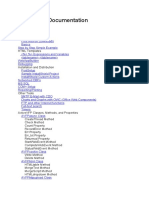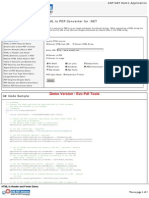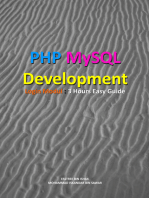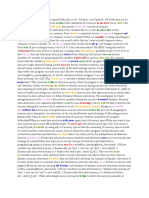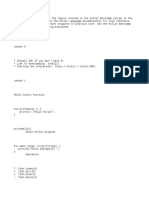Creating PDFs With Code Charge Studio
Creating PDFs With Code Charge Studio
Uploaded by
Nestor KammerCopyright:
Available Formats
Creating PDFs With Code Charge Studio
Creating PDFs With Code Charge Studio
Uploaded by
Nestor KammerCopyright
Available Formats
Share this document
Did you find this document useful?
Is this content inappropriate?
Copyright:
Available Formats
Creating PDFs With Code Charge Studio
Creating PDFs With Code Charge Studio
Uploaded by
Nestor KammerCopyright:
Available Formats
Creating PDF Documents with CodeCharge Studio
This document will provide you some insight into creating your own reports, output as PDF files, from CodeCharge pages. Actually, the process works for any URL want to capture. There is a very powerful set of functions available as GPL'd code. Most of what you need will be installed and ready to go if your webserver is Linux. I set this up on a Fedora Core distribution from RedHat and it was extremely easy. Only the outer "wrapper" from http://www.rustyparts.com was missing - everything else is in the Fedora distribution.
What do you need?
The process described in this document takes HTML from any URL, but in particular, from a CCS "report" page. The HTML is converted into PostScript, then the PostScript is converted into PDF. No Adobe components are used, everything is public domain. The shopping list of "parts" you need: Linux/Unix Apache httpd (bundled with Linux) PEAR library (supports PHP: http://pear.php.com Perl scripting language version 5 (bundled with Linux) GhostScript PS to PDF converter (bundled with Linux) HTML_2PDF PHP class module from http://www.rustyparts.com html2ps perlscript from http://user.it.uu.se/~jan Actually, all of these items are available for use on Windows 2000. I ran into numerous problems trying to correctly define paths to all the scripts and executables. The documentation is quite thin and I was not able to figure out why the PS to PDF convertor would not work from the script - it worked fine on it's own. Rather than fight it, and the intended target server was Linux anyway, I quit trying to get it to work on Windows 2000. HTML_2PDF actually implements several options for inputting HTML. I used the "from an external URL" method, which meant I could create the report however I wanted it to look, by designing a page in CCS, then let the HTML_2PDF script scrape that page to get the data. This also means you can direct it at any URL on the WWW and save the page as a PDF file!
Hooking it up to CodeCharge Studio
Typically a report requires parameters: date ranges, customer number, etc. So it's not enough to just give the script a URL. I wrote a simple report configuration front-end. The reports I needed required a small set of parameters (about 5 different ones). So I created a table to store the report URL as a string, and then added 5 boolean columns to indicate which parameters were needed. The Report form contains 5 sets of data fields, and these are either hidden or visible depending on whether the report needs them. Users run reports by selecting the name, This causes the appropriate list of parameters to be requested. Code in the "Submit" button's Server OnClick event. This event assembles the parameters from the form, instantiates and invokes the object implemented by HTML_2PDF. This creates the report and stores it in a folder on the webserver. A table stores report descriptions and the URL where the report was filed. This let's users retrieve them via their web browser. Here's a screen shot of the report interface for users.
2004, Donald N. Bevis for GoToDon.com Permission is granted to distribute freely as long as this copyright notice is retained in it's entirety without modification. Ownership of this document remains with the copyright holder. Improvements or corrections are welcomed. See http://www.GoToDon.Com/ccbth for contact information. This document is available for download from the aforementioned location
Creating PDF Documents with CodeCharge Studio
The code called by the Run Report button is shown below. It is mostly unchanged from the example provided at rustyparts.com. I just pasted it into the event code-file for my report page.
Creating the Reports
This is the really easy part. The reports have to conform to the above-listed parameters (at least thr my application). Beyond that, the report is anything you want it to be. I created reports as regular CCS pages with grids or record controls. The one thing to remember is that you can't use a Navigator to paginate your report - it has to be output in one continuous stream. So page breaks are not going to be automatically inserted. This is a simple report mechanism. I probably would use a dedicated report-generator if I wanted really sophisticated output, with headers, footers, pagination, grouping and so on. But for simple things like printing invoices or other small reports, it is a good fit. You can put code into the Before Show Row event to insert a page break and/or header every "n" lines and do a reasonably good job of pagination. By default the conversion script converts everything in the specified URL - including buttons, textboxes or other controls. I edited my copy of the script in a couple places to not render the outlines of textboxes and to skip buttons. This made a better looking report for my application.
Report-execution function called from Event handler
When setting up the PDF conversion, it is helpful to set $pdf->setDebug(true); to have t display on-screen all the conversion steps and their final outcomes.
2004, Donald N. Bevis for GoToDon.com Permission is granted to distribute freely as long as this copyright notice is retained in it's entirety without modification. Ownership of this document remains with the copyright holder. Improvements or corrections are welcomed. See http://www.GoToDon.Com/ccbth for contact information. This document is available for download from the aforementioned location
Creating PDF Documents with CodeCharge Studio
// Invoke the HTML_2PDF conversion obtained from http://www.rustyparts.com function run_report($pdfFile, $htmlFile, $defaultDomain) {
// require the class require_once dirname('__FILE__') .'/reports/pdf/HTML_ToPDF-custom.php';
// remove old one, just to make sure we are making it afresh @unlink($pdfFile);
$pdf =& new HTML_ToPDF($htmlFile, $defaultDomain, $pdfFile);
$pdf->setTmpDir(dirname('__FILE__') .'/reports/pdf/tmp/');
// Control the output of additional debug information $pdf->setDebug(false); // When 'true' this dumps tracing info to the browser while the conversion to PDF executes
// set that we do want to use the page's css $pdf->setUseCSS(true); // give it our own css, in this case it will make it so // the lines are double spaced $pdf->setAdditionalCSS(' p { line-height: 1.8em; font-size: 12pt; }'); // don't want to underline hyperlinks $pdf->setUnderlineLinks(false); // scale the page down slightly, just seems to fit the page better $pdf->setScaleFactor('.9'); // make the page black and light $pdf->setUseColor(false);
2004, Donald N. Bevis for GoToDon.com Permission is granted to distribute freely as long as this copyright notice is retained in it's entirety without modification. Ownership of this document remains with the copyright holder. Improvements or corrections are welcomed. See http://www.GoToDon.Com/ccbth for contact information. This document is available for download from the aforementioned location
Creating PDF Documents with CodeCharge Studio
// convert the HTML file to PDF $result = $pdf->convert(); // PDFs are created and owned by "apache", let the users access them by this chmod, chown if (file_exists($pdfFile)) { chmod($pdfFile, 0777); // } chown($pdfFile, 'nobody');
// check if the result was an error return PEAR::isError($result);
Event code for the "Run Report" button
This simply gathers data from the form, assembles the complete URL for running the report, generates a filename (in this instance a path to the folder "uploads". The application incorporated a fileupload function and so reports were designed to be stored in the same folder and listed in the same "directory" (CCS grid) with all the uploaded files.
2004, Donald N. Bevis for GoToDon.com Permission is granted to distribute freely as long as this copyright notice is retained in it's entirety without modification. Ownership of this document remains with the copyright holder. Improvements or corrections are welcomed. See http://www.GoToDon.Com/ccbth for contact information. This document is available for download from the aforementioned location
Creating PDF Documents with CodeCharge Studio
//reports_Button_Run_OnClick @19-E856C3FF function reports_Button_Run_OnClick() { $reports_Button_Run_OnClick = true; //End reports_Button_Run_OnClick
//Custom Code @33-A43F7AC2 // ------------------------global $reports; global $Redirect;
// $hostdomain = "localhost"; are not on a different server // Change this if the reports
// Invoke the report-generator object to produce the PDF copy of our report URL
// The list of POST parameters here must correspond to each of the form fields that accept user input // By convention, all .php report files are designed to recognize parameters // by the names cid, pid, yr,st and en $sep = "?"; $temp = CCGetFromPost("cid","0"); if ($temp !== "0") { $params = $params . $sep . "cid=" . $temp; $sep = "&"; }
$temp = CCGetFromPost("List_Ppty","0"); if ($temp !== "0") { $params = $params . "&pid=" . $temp; $sep = "&"; }
2004, Donald N. Bevis for GoToDon.com Permission is granted to distribute freely as long as this copyright notice is retained in it's entirety without modification. Ownership of this document remains with the copyright holder. Improvements or corrections are welcomed. See http://www.GoToDon.Com/ccbth for contact information. This document is available for download from the aforementioned location
Creating PDF Documents with CodeCharge Studio
$temp = CCGetFromPost("Text_Year","0000"); if ($temp !== "0") { $params = $params . "&yr=" . $temp; $sep = "&"; }
$temp = CCGetFromPost("Text_From","0000"); if ($temp !== "0") { $params = $params . "&st=" . $temp; $sep = "&"; }
$temp = CCGetFromPost("Text_To","0000"); if ($temp !== "0") { $params = $params . "&en=" . $temp; $sep = "&"; }
//
Determine where the output file will be stored $rptpath = "/uploads/" . CCGetParam("cid","0") . "/";
//
Create the output filename based on the reportname field $filename = $reports->reportname->GetValue() . ".pdf";
// Ensure the file does not exist, append a number to it until we create a unique file name // This is the same algorithm as used by the FileUpload class
$file_exists = true; $index = 0; while($file_exists) { $ActualFileName = dirname(__FILE__) . $rptpath . date("YmdHis") . $index . "." . $filename;
2004, Donald N. Bevis for GoToDon.com Permission is granted to distribute freely as long as this copyright notice is retained in it's entirety without modification. Ownership of this document remains with the copyright holder. Improvements or corrections are welcomed. See http://www.GoToDon.Com/ccbth for contact information. This document is available for download from the aforementioned location
Creating PDF Documents with CodeCharge Studio
$last_report_URL = ServerURL . $index . "." . $filename; $rptpath . date("YmdHis") .
$last_report_file = date("YmdHis") . $index . "." . $filename; $file_exists = file_exists($ActualFileName); $index++; }
$output_file = $ActualFileName;
$report_URL = $reports->new_URL->GetValue();
// Construction the URL of the report to be run by combining the URI of the report with the query parameters if (strcasecmp(substr($report_URL,1,5),"http:") == 0) {
} else { // Construct a URL from various parts
if (substr($report_URL,1,1) !== "/") { $report_URL = "/" . $report_URL; } $report_URL = ServerURL . "reports" . $report_URL . ".php" . $params; }
//
Produce the report run_report($output_file, $report_URL, $hostdomain);
// // Determine whether the report ran correctly or not if (file_exists($output_file)) { // Temporarily store the filename and callback this php page with a parameter so it displays the "reportlog" form CCSetSession("last_report_path",$output_file); CCSetSession("last_report_URL",$last_report_URL);
2004, Donald N. Bevis for GoToDon.com Permission is granted to distribute freely as long as this copyright notice is retained in it's entirety without modification. Ownership of this document remains with the copyright holder. Improvements or corrections are welcomed. See http://www.GoToDon.Com/ccbth for contact information. This document is available for download from the aforementioned location
Creating PDF Documents with CodeCharge Studio
CCSetSession("last_report_file",$last_report_file);
$Redirect = $Redirect . "&rpt=1"; } else { echo "<br>File was not created<br>"; }
// ------------------------//End Custom Code
//Close reports_Button_Run_OnClick @19-F550C3E4 return $reports_Button_Run_OnClick; } //End Close reports_Button_Run_OnClick
2004, Donald N. Bevis for GoToDon.com Permission is granted to distribute freely as long as this copyright notice is retained in it's entirety without modification. Ownership of this document remains with the copyright holder. Improvements or corrections are welcomed. See http://www.GoToDon.Com/ccbth for contact information. This document is available for download from the aforementioned location
You might also like
- Uci AssignmentDocument6 pagesUci Assignmentpeternya619No ratings yet
- ActiveVFP DocumentationDocument18 pagesActiveVFP DocumentationthomasandriantoNo ratings yet
- Demystifying Ethereum AssemblyDocument43 pagesDemystifying Ethereum AssemblyisnullNo ratings yet
- As10g Installation StepsDocument5 pagesAs10g Installation StepsIhtsham TahirNo ratings yet
- Case Study On Windows Vista HistoryDocument11 pagesCase Study On Windows Vista HistoryReshma Jawale0% (1)
- A Project On Packers and MoversDocument53 pagesA Project On Packers and Moversvivek67% (6)
- Comm Prog - FexamDocument99 pagesComm Prog - Fexammoncarla lagon33% (3)
- Creating PDFs With Code Charge Studio PDFDocument8 pagesCreating PDFs With Code Charge Studio PDFFreddy ManullangNo ratings yet
- Convert HTML To PDF in PHPDocument4 pagesConvert HTML To PDF in PHPzandiNo ratings yet
- PDF Generator Ne3t.aspxDocument11 pagesPDF Generator Ne3t.aspxtpcmvNo ratings yet
- CGI Programming in CDocument27 pagesCGI Programming in CPiya BaradNo ratings yet
- Pdfkit Guide: by Devon GovettDocument64 pagesPdfkit Guide: by Devon GovettToxicNo ratings yet
- BPC 10 For NetWeaver LoadRunner ToolkitDocument17 pagesBPC 10 For NetWeaver LoadRunner ToolkitRasim DönmezNo ratings yet
- guideDocument66 pagesguideHtc DesireNo ratings yet
- GuideDocument66 pagesGuideyogaba2550No ratings yet
- Pdfkit Guide: by Devon GovettDocument36 pagesPdfkit Guide: by Devon GovettDaniel MokNo ratings yet
- Module 7 Lecture Notes: 635.482: Website DevelopmentDocument5 pagesModule 7 Lecture Notes: 635.482: Website DevelopmentAlfred JengoNo ratings yet
- Deploy Webutil in OracleDocument14 pagesDeploy Webutil in Oracletranhieu5959No ratings yet
- Exportar Crystal PT To PDFDocument9 pagesExportar Crystal PT To PDFJrgErnNo ratings yet
- Enhance PDF Generation Efficiency in Laravel Blog-2024Document6 pagesEnhance PDF Generation Efficiency in Laravel Blog-2024gospeloftruthtamilNo ratings yet
- A Program That Illustrates The Use of The Matching OperatorDocument6 pagesA Program That Illustrates The Use of The Matching OperatorsreenimolNo ratings yet
- Deepika MishraDocument28 pagesDeepika Mishraanudwivediii007No ratings yet
- Getting Started With EVO HTML To PDF ConverterDocument2 pagesGetting Started With EVO HTML To PDF ConverterAlfredo AndradeNo ratings yet
- Angular 8 Crash Course IIDocument5 pagesAngular 8 Crash Course IIJhon HernándezNo ratings yet
- HACK THE BOX - Omni 10.10.10.204 (Writeup/Walkthrough)Document16 pagesHACK THE BOX - Omni 10.10.10.204 (Writeup/Walkthrough)Jean PierreNo ratings yet
- Fine Form For The WebDocument4 pagesFine Form For The Webad2avNo ratings yet
- What Is CGI ?: Web BrowsingDocument15 pagesWhat Is CGI ?: Web Browsingapi-278351473No ratings yet
- Forms BIP v22Document31 pagesForms BIP v22ajay0712100% (1)
- How To Easily Create PDF Documents in ASPDocument6 pagesHow To Easily Create PDF Documents in ASPRony OlazabalNo ratings yet
- PDF MakerDocument59 pagesPDF MakerAnonymous 1aCZDEbMMNo ratings yet
- ExportDocument7 pagesExportPedro Henrique Francisco Pnss esse de nssnnereiraNo ratings yet
- Web Based Application (HTML) Form Creation & Submission in Node-RedDocument13 pagesWeb Based Application (HTML) Form Creation & Submission in Node-Redswathi.ns2021No ratings yet
- Adding Features CSharpDocument38 pagesAdding Features CSharpVilciu ConstantinNo ratings yet
- Pdfmaker PDFDocument63 pagesPdfmaker PDFmsahin1955No ratings yet
- Embedded HTTP Server: Protocol For Embedded and SBC Device CommunicationDocument7 pagesEmbedded HTTP Server: Protocol For Embedded and SBC Device CommunicationmdcarraroNo ratings yet
- Maxbox Arduino Pascal MagazineDocument8 pagesMaxbox Arduino Pascal MagazineMax KleinerNo ratings yet
- Building Web Apps With GoDocument39 pagesBuilding Web Apps With Gogeronimo montiNo ratings yet
- IM Appendix J Web DB Dev With ColdFusion Ed12Document15 pagesIM Appendix J Web DB Dev With ColdFusion Ed12Chong Fong KimNo ratings yet
- How To Set Up Mass Virtual Hosting With Apache2 + Mod - Rewrite + Mod - Userdir + Mod - Suexec On CentOS 5Document6 pagesHow To Set Up Mass Virtual Hosting With Apache2 + Mod - Rewrite + Mod - Userdir + Mod - Suexec On CentOS 5Yahya NursalimNo ratings yet
- Error Generating PDF Document ObieeDocument2 pagesError Generating PDF Document ObieeKatrinaNo ratings yet
- Powershell Creating ReportsDocument23 pagesPowershell Creating ReportsashokkumarmduNo ratings yet
- call_bi_publisher_sub_template_locallyDocument15 pagescall_bi_publisher_sub_template_locallyAli AliNo ratings yet
- PDF xhtml2pdfDocument4 pagesPDF xhtml2pdfSanket ChiprikarNo ratings yet
- SAML Integration Using SimpleSAMLphp For ADFSDocument15 pagesSAML Integration Using SimpleSAMLphp For ADFSjosebafilipoNo ratings yet
- Expt 1Document14 pagesExpt 1swathi.ns2021No ratings yet
- Chapter 5 Cgi & PHPDocument77 pagesChapter 5 Cgi & PHPEfoy TechNo ratings yet
- Export OBIEE RPD DocumentationDocument5 pagesExport OBIEE RPD DocumentationAsad HussainNo ratings yet
- Common Gateway InterfaceDocument7 pagesCommon Gateway InterfaceeliaezekielNo ratings yet
- 4020 Week 2Document84 pages4020 Week 2khanpmsg26No ratings yet
- Cognos Mashup ServiceDocument11 pagesCognos Mashup ServiceYong ZhangNo ratings yet
- Understanding CGI With C#Document22 pagesUnderstanding CGI With C#Martin MoralesNo ratings yet
- WE Unit-3 CGIDocument25 pagesWE Unit-3 CGIpankajusbNo ratings yet
- PhpStorm DockerSupportinPhpStorm 200116 0030 2498Document12 pagesPhpStorm DockerSupportinPhpStorm 200116 0030 2498Mashe1985No ratings yet
- IWT - Module - IVDocument47 pagesIWT - Module - IVArpit RathNo ratings yet
- Configuration Guide: Smartconnector™ For Apache HTTP Server Access FileDocument9 pagesConfiguration Guide: Smartconnector™ For Apache HTTP Server Access Filejandoo8812No ratings yet
- Hiddy v1.1 Server InstallationDocument6 pagesHiddy v1.1 Server InstallationBala MuraliNo ratings yet
- U1 PHPDocument16 pagesU1 PHPVikram NairyNo ratings yet
- ID 1263918.1 Active Directory OID 11g Synch Quick Start GuideDocument6 pagesID 1263918.1 Active Directory OID 11g Synch Quick Start GuidevirtualmemoryNo ratings yet
- dBASE 2019 and Apache 24x - Configuration GuideDocument21 pagesdBASE 2019 and Apache 24x - Configuration GuideSoportetuxtla JarhNo ratings yet
- Delphi ProgrammingDocument18 pagesDelphi ProgrammingDamir OmanovićNo ratings yet
- Chapter Five Server Side Scripts: Common Gateway Interface (CGI)Document24 pagesChapter Five Server Side Scripts: Common Gateway Interface (CGI)Efoy TechNo ratings yet
- PHP MySQL Development of Login Modul: 3 hours Easy GuideFrom EverandPHP MySQL Development of Login Modul: 3 hours Easy GuideRating: 5 out of 5 stars5/5 (1)
- Excreted From:: Build-A-Shopping-Cart-Using-Codeigniter-And-JqueryDocument28 pagesExcreted From:: Build-A-Shopping-Cart-Using-Codeigniter-And-Jqueryzeeshanali2635No ratings yet
- Niq Logistics PropozalsDocument20 pagesNiq Logistics PropozalsPelumi Gabriel obafayeNo ratings yet
- WinAVR User ManualDocument23 pagesWinAVR User ManualMohan Raj GuptaNo ratings yet
- React Cheat SheetDocument2 pagesReact Cheat SheetVikram BhaskaranNo ratings yet
- Hamza Ahmed CVDocument1 pageHamza Ahmed CVHamza AhmedNo ratings yet
- What Is Dynamic Memory AllocationDocument2 pagesWhat Is Dynamic Memory AllocationRashmi SamarasinghaNo ratings yet
- Log - Ga Tau Ambil AjaDocument20 pagesLog - Ga Tau Ambil AjaReyhans DarmawanNo ratings yet
- Topic:: Files & I/ODocument30 pagesTopic:: Files & I/OMs. M. KAVITHA MARGRET Asst Prof CSENo ratings yet
- Installed Base ErrorsDocument5 pagesInstalled Base ErrorsManmohan KulkarniNo ratings yet
- MHBA Lab 12Document15 pagesMHBA Lab 12Hassan AdeelNo ratings yet
- Control-Statements-In-JavaDocument24 pagesControl-Statements-In-JavaHKNo ratings yet
- Java LAB 9Document5 pagesJava LAB 9Hasnain MalikNo ratings yet
- Complete Path To Javascript MasteryDocument323 pagesComplete Path To Javascript MasteryfatfatwalenileshNo ratings yet
- UTD Web ProgrammingDocument2 pagesUTD Web ProgrammingSmrafi SultanNo ratings yet
- MCSL-017 Solved Assignment July 2017 - January 2017 SessionDocument8 pagesMCSL-017 Solved Assignment July 2017 - January 2017 SessionSunnyAryaNo ratings yet
- What Is Linux and Why Is It So Popular?Document177 pagesWhat Is Linux and Why Is It So Popular?Manjunath.R100% (2)
- Final Report FYP 12 AugDocument184 pagesFinal Report FYP 12 AugQuratulain TariqNo ratings yet
- Python UNIT 5Document6 pagesPython UNIT 5rajanikanthNo ratings yet
- ASP AssingmentDocument154 pagesASP AssingmentshashinNo ratings yet
- Ch. 1 Getting Started W - JavaDocument14 pagesCh. 1 Getting Started W - JavathateggoNo ratings yet
- Kotlin Quick Reference SheetDocument18 pagesKotlin Quick Reference SheetjoekajebeNo ratings yet
- MẪU CV BẰNG TIẾNG ANHDocument6 pagesMẪU CV BẰNG TIẾNG ANHLệ NguyễnNo ratings yet
- Question for Salesforce InterviewDocument9 pagesQuestion for Salesforce Interviewwakere1881No ratings yet
- Example Java Pdf417 ScriptDocument2 pagesExample Java Pdf417 ScriptRameshNo ratings yet
- Service-Oriented Architecture (SOA)Document11 pagesService-Oriented Architecture (SOA)Al-Muneer Sound Vehari100% (1)

